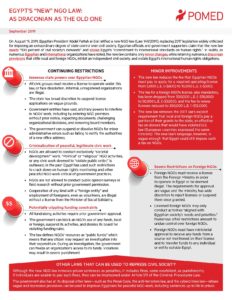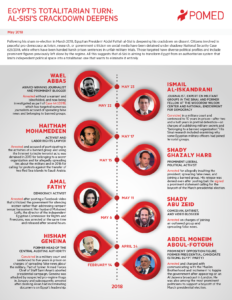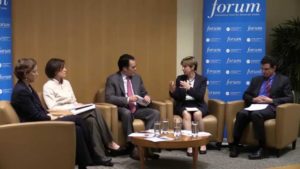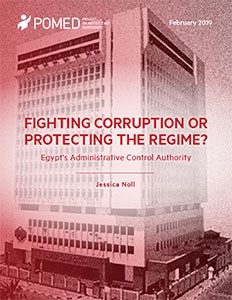
POMED
Jamal Khashoggi and I disagreed on almost all political issues, but we agreed on one thing: that the Arab world had profoundly changed in ways that rendered the old regimes incapable of governing, notes Ezzedine C. Fishere, the author of “The Egyptian Assassin” and a visiting professor at Dartmouth College.
We agreed that democratization was the only way forward but disagreed on what it meant. I accused him of embracing an “Islamist majoritarian” version of democracy, where electoral victories justify the repression of minorities and the erosion of individual rights. He accused me of embracing a “secularist authoritarian” version of democracy, where liberalism justifies repressing Islamist majorities, he writes for The Washington Post, offering a reminder of the promise that Jamal offered: the chance to reconcile political Islam and liberal democracy:
 The work needed to fulfill this promise still lies ahead of us. Those who advocate democratizing the Arab world have not yet agreed among themselves on how to achieve the productive coexistence of democracy and Islamism. But unless those of us who haven’t yet been murdered fulfill this promise, many more Arabs will need requiems.
The work needed to fulfill this promise still lies ahead of us. Those who advocate democratizing the Arab world have not yet agreed among themselves on how to achieve the productive coexistence of democracy and Islamism. But unless those of us who haven’t yet been murdered fulfill this promise, many more Arabs will need requiems.
The current peaceful anti-corruption protests in Egypt are a reminder of the region’s volatility and the vulnerability of regimes presiding over acute socio-economic inequality, observers suggest. The re-arrest of a prominent Egyptian dissident, comes after the detention of over 2,000 individuals since September 20, including prominent public figures and activists such as Alaa Abdel Fattah, Mahinour al Masry, Mohamed Baqer, Hassan Nafaa, Khaled Daoud, Hazem Hosny. Fattah (see below) was freed in March after serving a five-year sentence for organising a protest without permission, the BBC reports.

POMED
HA Hellyer, a senior fellow at the Royal United Services Institute, said the arrest of Mr Abdel-Fattah “will be taken as a cautionary message to others, rather than as evidence that he himself is seen as some kind of dangerous fiend”. He noted that the generation of activists inspired by Mr Abdel-Fattah and who took part in the 2011 revolution, had not been taking to the streets, the FT’s Heba Saleh adds.
“There is hardly any threat obvious from someone who is in police custody from 6pm to 6am every day and the authorities are likely aware of that,” Mr Hellyer said.
Even more telling is the fact that arrests are not limited to renowned opposition figures, notes Lancaster University analyst They have also targeted al-Sisi’s critics, some of whom are affiliated to the armed forces, such as the spokesperson of the former army chief of staff Sami Anan, she writes for The Conversation:
Coupled with the fact that officers who ran against al-Sisi in the presidential campaigns had already been detained, the latest round of arrests reveals al-Sisi’s growing concern over internal dissent in the armed forces. This suggests his regime is nowhere near as stable or secure as he portrays it to be.
 A third of Egyptians live in poverty, according to the government’s official statistics. When the attorney general’s office announced Thursday that it was investigating about 1,000 people in connection with the protests, it said that many of them had cited economic grievances to explain their actions, The New York Times reports:
A third of Egyptians live in poverty, according to the government’s official statistics. When the attorney general’s office announced Thursday that it was investigating about 1,000 people in connection with the protests, it said that many of them had cited economic grievances to explain their actions, The New York Times reports:
The original demonstrations stemmed from a call by Mohamed Ali, a military construction contractor turned self-proclaimed whistle-blower living in exile in Spain. In a series of widely watched videos posted on social media, he has accused Mr. el-Sisi of wasting public funds on extravagant projects, offering an insider account of what he described as presidential corruption and hypocrisy. In a video he released Friday afternoon, he hinted that he was not finished, vowing to play a long game that, he declared to Mr. el-Sisi, would “wear you and your army out.”…
 Michele Dunne, (2nd from right) director of the Middle East Program at the Carnegie Endowment for International Peace, noted that while much of the traditional opposition was in prison or resigned to waiting Mr. el-Sisi out because the alternative was unclear, the makeup of the most recent protesters — mostly young and male, with little to lose — made the future of the movement hard to predict.
Michele Dunne, (2nd from right) director of the Middle East Program at the Carnegie Endowment for International Peace, noted that while much of the traditional opposition was in prison or resigned to waiting Mr. el-Sisi out because the alternative was unclear, the makeup of the most recent protesters — mostly young and male, with little to lose — made the future of the movement hard to predict.
“They certainly don’t seem to be organized or politically calculating about exactly what they’re trying to achieve, other than bringing down this one man,” said Dunne, a board member of the National Endowment for Democracy, but “they will regather themselves and come out when there’s an opportunity to.”
 In the 21st century, media and digital tools are increasingly becoming a central component of the public sphere and the political process, where the limitations of—as well as the prospects for—democratic reform are evolving with advances in technology. In the Arab world in particular, digital activism and cyber politics have manifested themselves at least since the mass protests of 2011, the Arab Center observes:
In the 21st century, media and digital tools are increasingly becoming a central component of the public sphere and the political process, where the limitations of—as well as the prospects for—democratic reform are evolving with advances in technology. In the Arab world in particular, digital activism and cyber politics have manifested themselves at least since the mass protests of 2011, the Arab Center observes:
 While social media tools and communication technologies have played a central role in uprisings and democracy, they have also become tools of the repressive policies of authoritarian regimes. With resurgent and entrenched authoritarianism in the last year, the Arab world has witnessed increased targeting of journalists and activists and further restrictions on freedoms of expression. The emergence of a renewed wave of protest and democratizing potential in the region is juxtaposed with a robust form of totalitarian rule, one that further threatens the state of freedoms and rights. From hacking and espionage campaigns to the targeting and killing of journalists, cyber geopolitics—including mass disinformation operations, troll factories, smear campaigns, silencing dissent, targeted cyberattacks, and espionage techniques—present a rapidly growing trend in Middle East politics.
While social media tools and communication technologies have played a central role in uprisings and democracy, they have also become tools of the repressive policies of authoritarian regimes. With resurgent and entrenched authoritarianism in the last year, the Arab world has witnessed increased targeting of journalists and activists and further restrictions on freedoms of expression. The emergence of a renewed wave of protest and democratizing potential in the region is juxtaposed with a robust form of totalitarian rule, one that further threatens the state of freedoms and rights. From hacking and espionage campaigns to the targeting and killing of journalists, cyber geopolitics—including mass disinformation operations, troll factories, smear campaigns, silencing dissent, targeted cyberattacks, and espionage techniques—present a rapidly growing trend in Middle East politics.
Arab Center Washington DC is dedicating its fourth annual conference to exploring the role of media and new technologies in human rights and democracy in the Arab world. Full agenda here. Thursday, October 31, 2019. 9:00 AM – 5:00 PM. JW Marriott, 1331 Pennsylvania Ave NW, Washington, DC 20004. RSVP.







